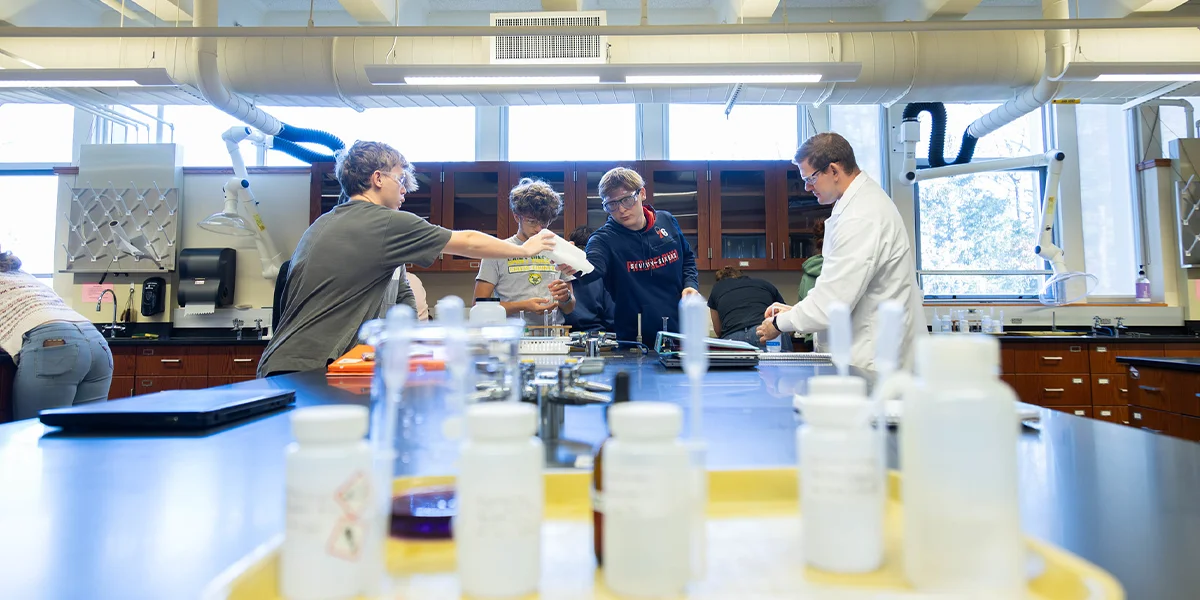Pharmacy Doctorate
- Joint Program
- Career Prep

-
In This Section
The Pharmacy Program
The cooperative program between Saint Vincent College and Duquesne University School of Pharmacy is a six-year pharmacy doctorate program leading to the Doctor of Pharmacy (Pharm.D.) degree. To practice pharmacy, students must pass a state licensure examination. Duquesne University requires that all students who wish to transfer into their program complete the PCAT exam, and interview as part of the application process.
Pre-Professional Programs
Undergraduate Admission
Phone:
800-782-5549
Ext. 2500
Email:
admission@stvincent.edu
What Can I Do With a Pharmacy Major at SVC?
The Allied health programs are specifically designed for students that wish to begin their college career at Saint Vincent, and then transfer to the urban campus of Duquesne University where they earn a graduate degree in their field of study. A number of other pharmacy programs such as Lake Erie College of Osteopathic Medicine (LECOM) and the University of Pittsburgh accept Saint Vincent Pre-Pharmacy Majors into their programs.
Curriculum Requirements
-
Requirements for the Pharmacy Doctorate program
Typical First-Year Schedule
Fall Semester
BL 150 General Biology I - 3 credits
BL 151 General Biology I Laboratory - 1 credit
CH 101 General Chemistry I - 3 credits
CH 103 General Chemistry I Laboratory - 1 credit
TH 119 Exploring Religious Meaning- 3 credits
PL 101 1st Philosophy - 3 credits
First-Year Seminar - 1 credit
Total 15Spring Semester
BL 152 General Biology II - 3 credits
BL 153 General Biology II Lab - 1 credit
CH 102 General Chemistry II - 3 credits
CH 104 General Chemistry II Lab - 1 credit
EL 102 Language & Rhetoric - 3 credits
PY 100 Introduction To Psychology - 3 credits
MA 109 or MA 111 Calculus I - 4 credits
Total 18Typical Second-Year Schedule
Fall Semester
CH 221 Organic Chemistry I - 3 credits
CH 223 Organic Chemistry I Laboratory - 1 credit
PH 111 General Physics I - 3 credits
PH 113 General Physics I Laboratory - 1 credit
BA 350 or PY 203 Statistics I - 3 credits
EC 101 Microeconomics or EC 102 Macroeconomics - 3 credits
Global Diversity* - 3 credits
Total 17Spring Semester
CH 221 Organic Chemistry II - 3 credits
CH 223 Organic Chemistry II Laboratory - 1 credit
Ethics** - 3 credits
Faith & Reasoning*** - 3 credits
AR/MU— Fine Arts Elective- 3 credits
EL— English Literature - 3 credits
Total 16*Global Diversity includes one of the following: TH 380 World Religions, TH 385 Buddhism, HI 108 Traditional East Asian Societies, HI 109 Modern East Asian Societies, HI 233 History of Latin America, HI 270 The Rise of Chinese Civilization, HI 280 Islamic Civilization I 3, HI 123 Global History I, HI 102 Western Civilization I or SO 101 Introduction to Sociology
** Ethics includes one of the following: PL 215 Ethics, Pl 216 Ethical Problems, TH 275 Catholic Sexual Ethics, PL 218 Bioethics or TH 280 Catholic Bioethics
***Faith & Reasoning includes one of the following: PL 235 Philosophy of God, PL 240 Influence of Philosophy on Theology, PL 100 Ancient and Medieval Philosophy, TH 255 Religion and Politics, TH 300 Systematics I, TH 325 Vatican II History and Theology, TH 344 Classics in Catholic Theology, TH 348 Film, Fiction and Faith or TH 366 Religious Beliefs of Abraham Lincoln.
In addition to the above requirements, all students that apply to Duquesne’s Pharmacy school will be required to submit scores for the Pharmacy College Admission Test (PCAT). An interview will also be required for Admission.
-
Prerequisites
Completion of High School Biology, Chemistry, Physics, and Pre-Calculus.
Program Highlights
Statistics
| Schools Attended | SVC (Matric/Applic) | SVC (% Accept) | National (Matric/Applic) | National (%Accept) |
|---|---|---|---|---|
| Medicine | 40/43 | 93% | ||
| Allopathic | 6/14 | 46% | 23,156 / 51,946 | 44.6% |
| Osteopathic | 34/36 | 94% | 9,631 / 22,107 | 43.6% |
| Dental | 7/7 | 100% | 6,719 / 12,491 | 53.8% |
| Optometry | 3/3 | 100% | 1,918 / 2,868 | 66.9% |
| Veterinary | 5/6 | 83% | 4,113 / 11,508 | 35.7% |
| Other (e.g. PT, PA, Pharm, Chiro, Podiat) | 22/22 | 100% | ||
| Total | 77/81 | 95% | ||
| SVC Statistics: May ’21 – May ’25 grads (5 years) | ||||
Student Learning Outcomes
- To broadly and effectively educate students in the theory and practice of science for success in the health and allied health professions.
- To empower students with the skills and knowledge of biology, chemistry, mathematics, and physics necessary to form a broad scientific foundation as preparation for admissions exams, and for application in the health and allied health professions.
- To specifically prepare undergraduate students for study in allopathic medicine, chiropractic medicine, dental medicine, osteopathic medicine, optometry, podiatric medicine, and veterinary medicine.
- To specifically prepare undergraduate students for study in allied health fields including nursing, occupational therapy, pharmacy, physical therapy, and physician assistant graduate programs.
Experiential Learning Prepares Students For Success
Gregory Bisignani, M.D., and Carl Hasselman, M.D., clinical professors at Saint Vincent College, describe their teaching laboratory periods in the Liberatore Human Anatomy Laboratory, a gift of Ralph and Donna Liberatore. The laboratory is used by undergraduate students for the study of human anatomy and physiology, facilitated by cadaveric dissection. The lab is also used by external clients for surgical training and demonstrations. Students observe and assist with demonstration surgeries, an opportunity Hasselman has described as a “huge step forward in preparing undergraduates for medical school.”
Pre-Professional Programs
Undergraduate Admission
Phone:
800-782-5549
Ext. 2500
Email:
admission@stvincent.edu
